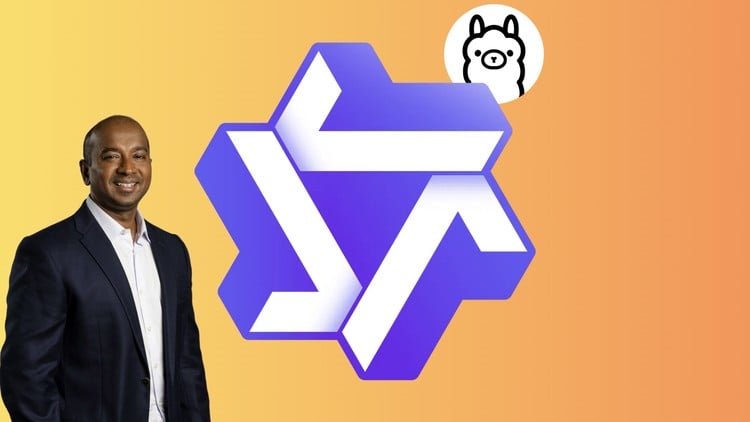
Build AI-powered applications locally using Qwen 2.5 & Ollama. Learn Python, FastAPI, and real-world AI development (AI)
⏱️ Length: 1.4 total hours
⭐ 4.20/5 rating
👥 15,929 students
🔄 February 2025 update
Add-On Information:
Note➛ Make sure your 𝐔𝐝𝐞𝐦𝐲 cart has only this course you're going to enroll it now, Remove all other courses from the 𝐔𝐝𝐞𝐦𝐲 cart before Enrolling!
-
Course Overview
- Practical deep dive into local AI application development using Qwen 2.5 and Ollama.
- Learn to deploy and manage advanced large language models on your personal hardware.
- Build AI applications free from cloud service dependencies and associated costs.
- Integrate powerful AI capabilities into your custom software solutions.
- Understand architecture for modern, privacy-preserving AI systems locally.
- Demystify local deployment of cutting-edge LLMs for real-world use cases.
- Develop expertise in creating intelligent apps with inherent data sovereignty.
- Explore a new paradigm for AI focused on control, security, and efficiency.
- Transform theoretical AI concepts into tangible, deployable, local applications.
- Position yourself at the forefront of local and edge AI innovation and practical implementation.
-
Requirements / Prerequisites
- Basic Python Knowledge: Familiarity with Python syntax, control structures, and function definitions.
- Web Concepts: Understanding of HTTP protocols, APIs, and client-server interactions.
- Command Line Comfort: Ability to navigate directories and execute commands within a terminal.
- Data Structures Basics: Awareness of how data is organized, stored, and processed in code.
- Operating System Use: Experience with Windows, macOS, or Linux environments and file systems.
- Moderate PC Resources: Access to a computer with a multi-core CPU and a minimum of 8GB RAM (16GB recommended).
- Optional GPU: An NVIDIA GPU (e.g., RTX 30-series or newer) for significantly accelerated inference performance.
- Initial Internet Access: Required once for software, library, and AI model downloads; not for continuous operation.
- Problem-Solving Skills: Eagerness to troubleshoot, debug code, and creatively resolve technical issues.
- Code Editor Proficiency: Experience with an Integrated Development Environment (IDE) like VS Code or PyCharm.
- Basic Development Workflow: Understanding project setup, testing, and dependency management.
- Interest in AI: A strong curiosity and passion for building and experimenting with artificial intelligence.
-
Skills Covered / Tools Used
- Ollama CLI Mastery: Command-line interface operations for managing LLM lifecycle and interactions.
- Qwen 2.5 Local Deployment: Practical expertise in running the Qwen 2.5 model efficiently with Ollama.
- Ollama Python SDK: Programmatic control over AI models within Python applications and scripts.
- FastAPI Backend Development: Building high-performance, asynchronous REST APIs to serve local AI.
- RESTful API Design: Crafting robust and scalable API endpoints for seamless AI integration.
- Asynchronous Python: Utilizing `async/await` for efficient, concurrent application performance.
- Local AI Optimization: Techniques to maximize LLM inference performance on your available hardware.
- Real-Time AI Inference: Achieving low-latency responses from locally running AI models.
- AI Application Architecture: Structuring complete AI solutions for local and hybrid deployments.
- Data Privacy by Design: Implementing secure, local AI processing solutions to protect sensitive data.
- System Resource Management: Optimizing CPU, GPU, and RAM utilization for demanding AI tasks.
- Full-Stack AI Concepts: Understanding integration points between local AI backends and front-end applications.
-
Benefits / Outcomes
- Achieve Data Sovereignty: Build AI applications where all sensitive data processing remains entirely local.
- Significant Cost Savings: Eliminate recurring expenses associated with cloud-based AI services and APIs.
- Full Offline Capability: Deploy AI solutions that function reliably without an active internet connection.
- Rapid Development Cycles: Quickly prototype and test AI features directly on your machine for faster iteration.
- Acquire In-Demand Skills: Master local AI deployment, a critical and growing niche in the tech industry.
- Enhanced Application Performance: Deliver faster AI responses with reduced network latency due to local inference.
- Future-Proof Your Expertise: Gain skills vital for edge computing, privacy-focused AI, and on-premise solutions.
- Unleash Creative Freedom: Experiment with various LLMs and custom modifications without usage or cost limits.
- Build Independent Products: Create powerful, self-contained AI applications free from cloud dependencies.
- Boost Career Opportunities: Showcase practical experience in cutting-edge, secure AI development.
- Contribute to Open-Source: Understand the local AI ecosystem deeply enough to engage and contribute effectively.
- Master Resource Efficiency: Learn optimal hardware utilization techniques for powerful AI model execution.
-
PROS
- Maximized Data Privacy: AI processing keeps sensitive data strictly local, ensuring robust security and compliance.
- Exceptional Cost-Efficiency: Develop advanced AI without recurring cloud infrastructure or API usage fees.
- Guaranteed Offline Functionality: Build AI applications that run reliably even without internet connectivity.
- Complete Control: Offers total command over model parameters, configurations, and the deployment environment.
- Accelerated Prototyping: Rapidly iterate and test AI features with instant local feedback, speeding development.
- Low-Latency Performance: Delivers near real-time AI responses due to direct, local model execution.
- Diverse Model Access: Easily manage and experiment with numerous open-source LLMs via the Ollama ecosystem.
- Edge AI Readiness: Directly applicable skills for deploying AI on resource-constrained edge devices.
- Independent Innovation: Empower yourself to build unique AI solutions autonomously without external service reliance.
- Deepened AI Understanding: Gain fundamental insights into LLM deployment, operation, and integration mechanics.
-
CONS
- Hardware Dependency: Local AI performance and the complexity of models you can run are inherently restricted by your machine’s CPU, RAM, and GPU capabilities.
Learning Tracks: English,Development,Data Science
Found It Free? Share It Fast!